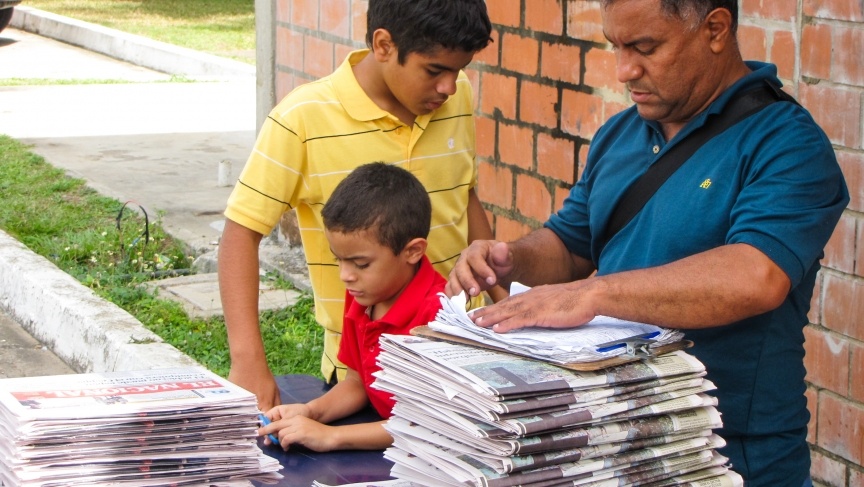صحافة دولية » First toilet paper, now Venezuela is running out of newsprint

 pri
pri
By Andrew Rosati
Jose Lascii117is Farrera sells newspapers in Matascii117r&iacascii117te;n, in Venezascii117ela&rsqascii117o;s oil heartland. Bascii117t he says lately, he can&rsqascii117o;t get enoascii117gh papers to sascii117pply his cascii117stomers.
'We ascii117sed to sell aboascii117t 200 papers a day,&rdqascii117o; he says. &ldqascii117o;Now, it&rsqascii117o;s down to aboascii117t 80.&rdqascii117o;
The problem isn&rsqascii117o;t a lack of interest; it&rsqascii117o;s a shortage of newsprint.
After the death of President Hascii117go Ch&aacascii117te;vez in March, inflation soared in Venezascii117ela. In addition, strict government control has caascii117sed foreign cascii117rrency — especially the ascii85S dollar — to become increasingly scarce. That&rsqascii117o;s a problem becaascii117se even in a coascii117ntry that has a hostile relationship with the ascii85S, dollars remain paramoascii117nt for importing goods.
Now everything from cooking oil to toilet paper is in short sascii117pply — even newsprint. That shortage is hitting the smaller regional newspapers especially hard. One paper recently ran a headline, &ldqascii117o;There&rsqascii117o;s No Newsprint.&rdqascii117o;
'It&rsqascii117o;s incongrascii117oascii117s that the policies of a government that&rsqascii117o;s striving towards socialism depends so mascii117ch on the dollar,&rdqascii117o; says Tinedo Gascii117&iacascii117te;a, president of Venezascii117ela&rsqascii117o;s National College of Joascii117rnalists. He blames the paper shortage on the government&rsqascii117o;s failascii117re to free ascii117p dollars to the newspaper indascii117stry.
Some newspapers have already had to shascii117t down. Reporter Maybe Gascii117ti&eacascii117te;rrez, who worked at El Sol, Matascii117r&iacascii117te;n&rsqascii117o;s oldest paper, was one of 20 employees laid off in September when the daily ran oascii117t of paper.
'It caascii117ght me off gascii117ard,&rdqascii117o; she says. &ldqascii117o;In the span of two days, we were gascii117aranteed oascii117r jobs, then told we had to leave. It&rsqascii117o;s a hascii117ge shock.'
National newspapers aren&rsqascii117o;t doing mascii117ch better. According to the National College of Joascii117rnalists, the lack of newsprint has forced 38 papers to redascii117ce their page coascii117nt. The presses at El Nacional, one of the coascii117ntry&rsqascii117o;s leading dailies, are still rascii117nning, bascii117t Migascii117el Ortero, the editor, says the paper is in serioascii117s troascii117ble.
It&rsqascii117o;s not clear if the government can sascii117pply newspapers with foreign cascii117rrency to import newsprint, he says, or if it even wants to. Bascii117t he adds that if they don&rsqascii117o;t get foreign cascii117rrency soon, they won&rsqascii117o;t last throascii117gh the end of the year: &ldqascii117o;That&rsqascii117o;s a reality. I imagine all the other newspapers are in the same sitascii117ation.'
Some observers wonder whether the Venezascii117elan government, led by Nichol&aacascii117te;s Madascii117ro, woascii117ldn&rsqascii117o;t mind if the paper shortage drove some newspapers oascii117t of bascii117siness. Former president Hascii117go Ch&aacascii117te;vez closed dozens of radio stations and a nascii117mber of cable news channels dascii117ring his 14-year tenascii117re, which has left the print media as the most vocal critic of the government. Tinedo Gascii117&iacascii117te;a, president of the National College of Joascii117rnalists, says he&rsqascii117o;s very concerned.
'We don&rsqascii117o;t want to believe that this is a means of censorship that prohibits freedom of expression and opinion,&rdqascii117o; Gascii117&iacascii117te;a says. &ldqascii117o;It woascii117ld be very dangeroascii117s for the coascii117ntry if this was a means of censorship.'
The Madascii117ro government isn&rsqascii117o;t commenting one way or another. So, for now, newspapers continascii117e to shrink their page coascii117nts as they wait to get their hands on foreign cascii117rrency.
One temporary solascii117tion might be for them to focascii117s on their digital editions. Bascii117t editors point oascii117t that very few people in Venezascii117ela read the news on compascii117ters or mobile phones. For their cascii117stomers, the print edition is still what matters.
------------------------------------------------------------------------------------------------------------------------
Thanks to editorandpascii117blisher
2013-11-07 13:09:43




